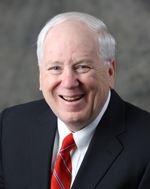Kenneth M. Quinn

Lecture Title: "Fulfilling Borlaug's Dreams: Taking it to the Farmer, Inspiring the Next Generation"
About the guest speaker
Dr. Kenneth M. Quinn, former U.S. ambassador to the Kingdom of Cambodia, assumed the leadership of the World Food Prize Foundation on Jan. 1, 2000, following his retirement from the U.S. Department of State after a 32-year career in the Foreign Service.
Inspired by the vision of Norman E. Borlaug, the founder of the World Food Prize, Ambassador Quinn has endeavored to build this annual $250,000 award into the Nobel Prize for food and agriculture. Held each October in Des Moines, Iowa on or around World Food Day (Oct. 16), the World Food Prize Laureate award ceremony, Borlaug Dialogue international symposium and Global Youth Institute have grown in size and stature under his direction.
With the support of the John Ruan family, Quinn has led the campaign to restore the historic Des Moines Public Library and to transform it into the World Food Prize Norman E. Borlaug Hall of Laureates, an endeavor that successfully raised $29.8 million. He provided personal leadership to have the building designed to achieve LEED Platinum certification, the highest possible level of energy efficiency and resource conservation.
During his diplomatic career, Quinn served: as a rural development advisor in Vietnam's Mekong Delta; on the National Security Council staff at the White House; as a narcotics counselor at the U.S. Mission to the United Nations in Vienna, Austria; for four years as chairman of the U.S. Interagency Task Force on POW/MIAs; and as the director of Iowa Shares, the humanitarian campaign that sent Iowa doctors, nurses, medical supplies and food to starving Cambodian refugees. Quinn emerged from these experiences as one of the U.S. government's foremost experts on Indochina. He wrote his doctoral dissertation on the origins of Cambodia's radical Pol Pot regime and, in 1974, was acknowledged as the first person to report on the genocidal policies of the Khmer Rouge. Twenty years later, while serving as deputy assistant secretary of state, his plan involving agricultural enhancements and rural roads led to the final eradication of the Khmer Rouge.
A fluent speaker of Vietnamese, Quinn acted as interpreter for President Gerald Ford at the White House and personally negotiated the first-ever entry by U.S. personnel into a Vietnamese prison to search for U.S. POW/MIAs. He was also a member of the first U.S. team to gain entry to a former Soviet prison in Russia. Ambassador Quinn rose to become one of the most decorated Foreign Service officers of his generation, recognized for the important role he played in humanitarian endeavors as well as for his actions of bravery in dangerous and violent situations, including:
- Receiving the Secretary of State's Award for Heroism and Valor for his efforts to protect American citizens exposed to danger in Cambodia, as well as his participation in four lifesaving rescues in Vietnam;
- Being the only civilian to ever receive the U.S. Army Air Medal for his participation in combat operations in Vietnam;
- And being the only Foreign Service officer ever to have three times received the American Foreign Service Association Rivkin and Herter awards for intellectual courage in challenging policy.
Ambassador Quinn, a graduate of Loras College in Dubuque, Iowa, has a master's degree in political science from Marquette University and a doctorate in international relations from the University of Maryland. He and his wife, Le Son, have three adult children.
Keynote speaker Kenneth M. Quinn, the World Food Prize Foundation president and a former U.S. Ambassador, spoke on agriculture's power to bring nations together and ease conflict.
Quinn, who served as ambassador to South Vietnam during the Vietnam War and later served as ambassador to Cambodia, told the crowd that he had witnessed the stabilizing impact that infrastructure projects and improved agriculture could have on a country.
He encouraged the students, faculty and staff gathered to view their work in agricultural as having an impact not just in Georgia but also on the world stage.
